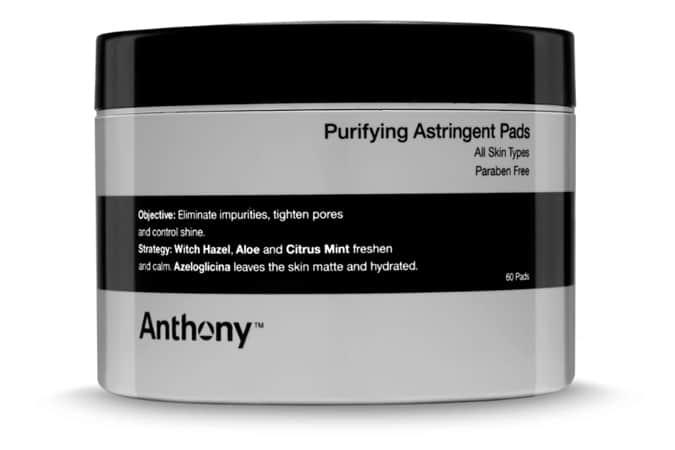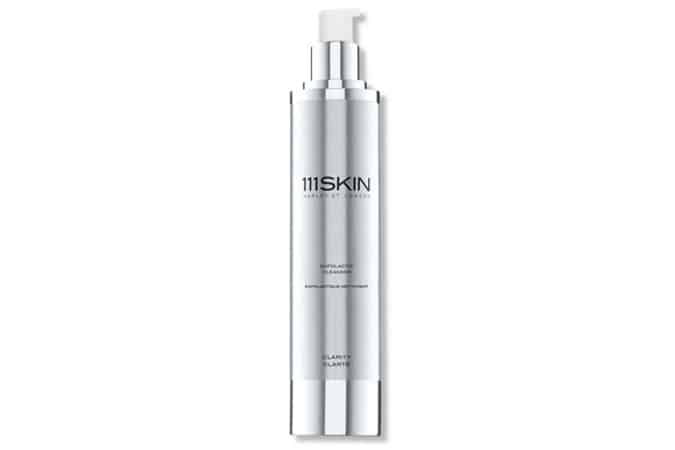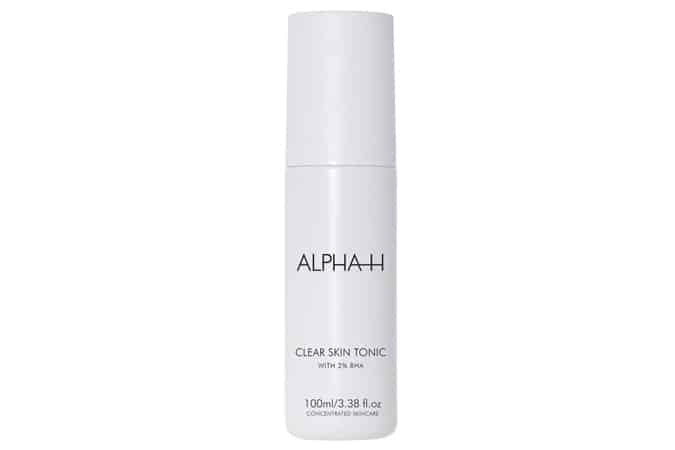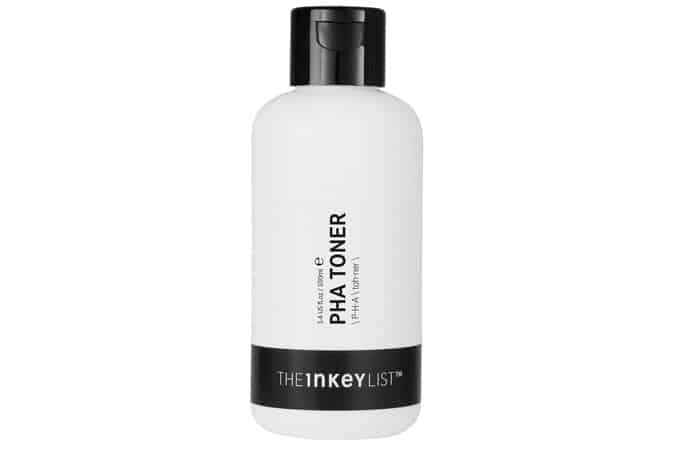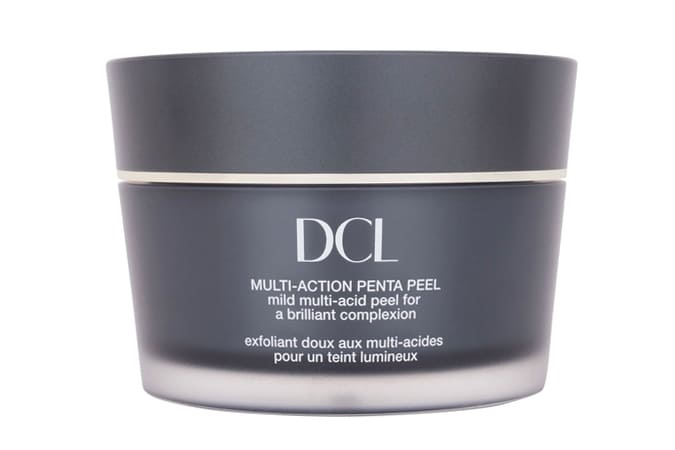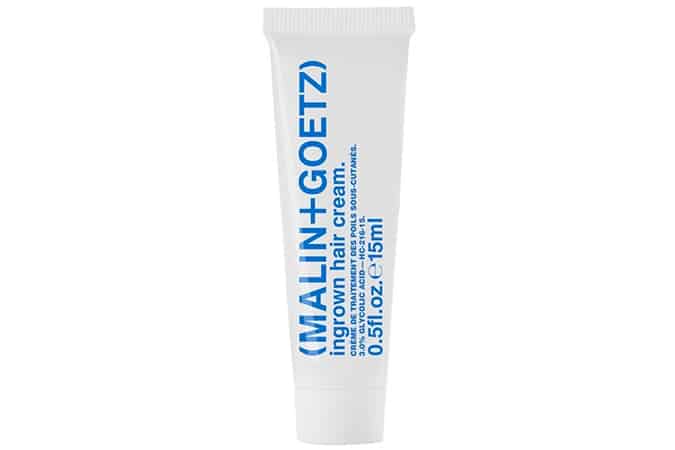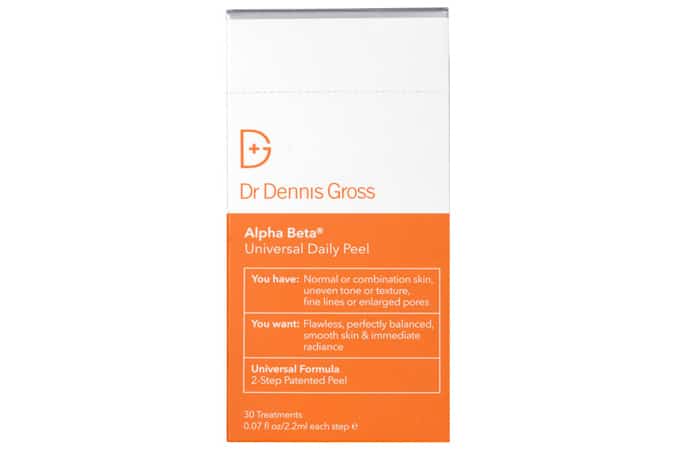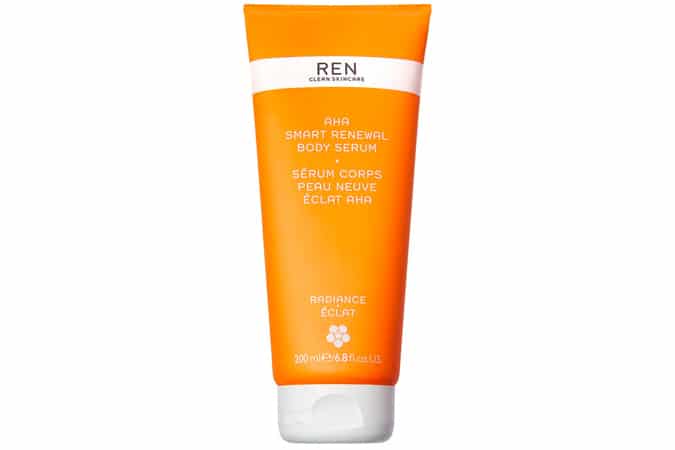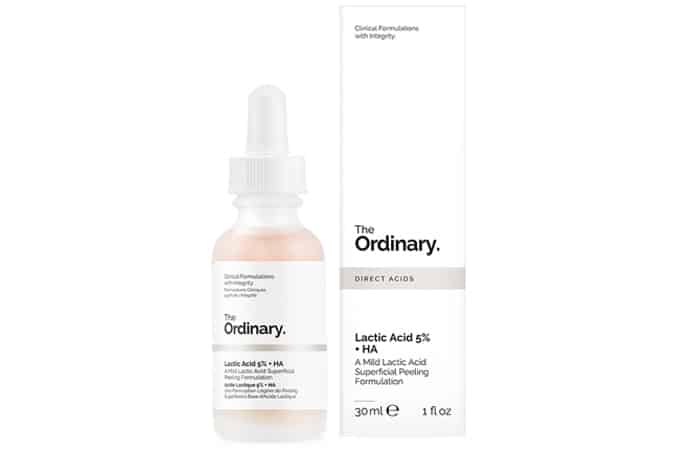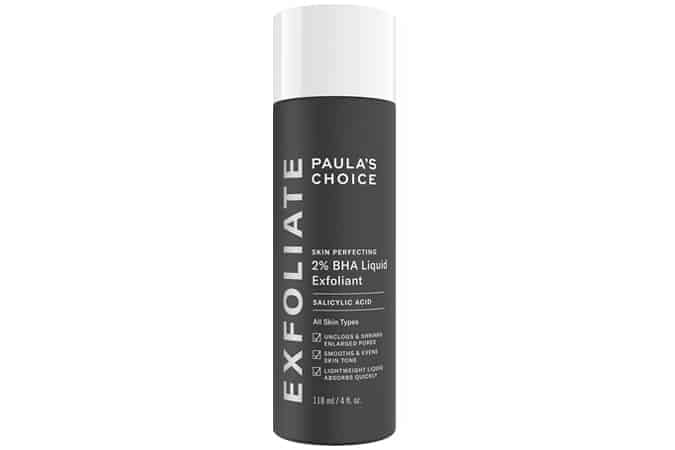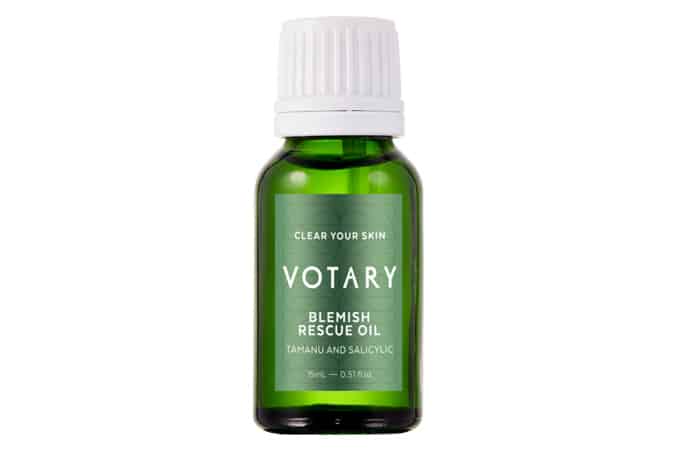It’s not hard to remember a time when acids were confined to chemistry class or the weapon of choice for Bond villains. Nasty, dangerous liquids that you wouldn’t want anywhere near you, let alone on your face.
Fast forward a few years, and chemical exfoliants containing just that have gone mainstream, stepping out of medical clinics and into the formulas of every major skincare product.
The reality is acids are not frightening at all. Harnessed in controlled quantities, they can dissolve dead skin cells, as well as oil, dirt and bacteria, to deliver a level of clean you simply couldn’t get from a face wash or physical exfoliator.
Big pores? Glycolic acid. Dull skin? Mandelic acid. Dry skin? Lactic acid. Oily skin? Salicylic acid. There’s an acid for every skin condition, so get over your fear and dive in for your best skin yet.
What Is A Chemical Exfoliant?
Chemical exfoliants are acids that react with the skin, removing built-up layers of dead cells and excess oil that can cause dull skin and blemishes.
“The results of chemical exfoliation are generally more uniform versus physical,” adds the godfather of acids himself, Dr Dennis Gross. “Though physical exfoliators do remove dead skin, it’s like taking sandpaper to a wood surface – if you look closely, you can see scratches.”
How Do Chemical Exfoliants Work?
“Chemical exfoliants safely remove the top layer of dead skin, allowing new, youthful, healthy skin to show through,” says Dr Gross.
However, all acids have a different cellular composition. Those made up of large molecules focus on the outer layers of skin, while some are much finer, able to dive deep within the dermis for a more thorough exfoliation.
How Often Should I Use A Chemical Exfoliant?
“In the past, dermatologists advised against daily exfoliation – forget this,” says Dr Gross. “Today we have advancements in formulations which allow us to exfoliate daily without stripping or irritating the skin.”
Although the good doctor says so, if you are new to acids, it’s wise to start with a chemical exfoliant twice a week and work your way up to daily.
Chemical Exfoliants: Types Of Acid
AHA (Alpha-Hydroxy Acids)
AHAs are a family of acids — including glycolic, lactic, mandelic, malic and tartaric — that are water-soluble. These are the ones you go to if texture, pigmentation, pores or a lacklustre complexion blight you. “AHAs a great chemical exfoliating agent,” explains Dr Gross, “these improve cell turnover for a brighter, clearer and younger appearance. They can also help lighten brown spots that result from sun damage.”
BHA (Beta-Hydroxy Acids)
BHAs — which mainly consist of salicylic acid — are oil-soluble and therefore able to dive deep into pores to dissolve excess sebum that can mix with dirt, dead skin cells and bacteria to cause blemishes. If blackheads, spots and general oiliness are your concern, go for a BHA.
Chemical Exfoliants: Dr Dennis Gross’s Acid Index
Glycolic Acid
“Glycolic acid is an AHA with the smallest molecular structure, which allows it to penetrate the skin for deeper exfoliation. Glycolic acid is used to improve the skin’s appearance and texture through exfoliation while reducing fine lines, hyperpigmentation, dark spots and uneven skin tone.”
Lactic Acid
“Lactic acid is a naturally-occurring acid that’s more gentle than glycolic acid. Lactic acid helps exfoliate as well as speed up cell renewal and turnover. It’s a great choice if you’re looking for a multi-tasker.”
Salicylic Acid
“Salicylic acid is a BHA that exfoliates the skin, reducing the number of pore blockages while building elastin and collagen. It’s also an anti-bacterial and anti-inflammatory acid which helps to calm and clarify the skin, making it suitable for combination to oily and acne-prone skin.”
The Best Chemical Exfoliants For Every Skin Type
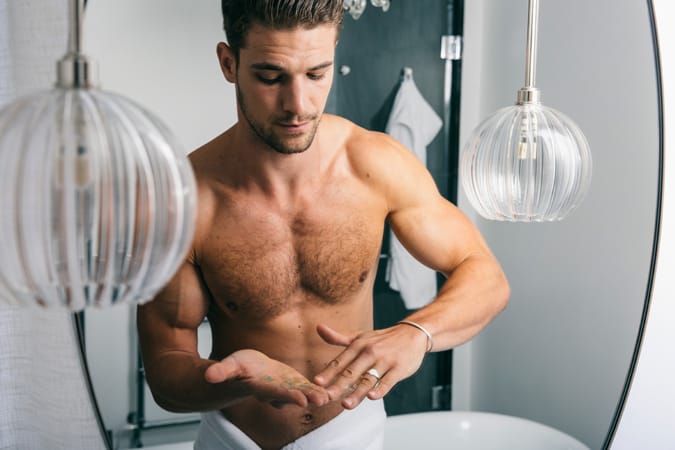
Best Everyday Chemical Exfoliant
Anthony Purifying Astringent Pads
Astringent pads are a great option if you want total ease – a few swipes over the skin and you’re done. Strong enough to give results, but soothing enough for daily use, Anthony’s blend of witch hazel, azelaic acid and aloe vera will strip the skin of impurities and excess oil without drying your complexion. With 60 vegan-friendly pads in the tub, you get a decent bang for your buck, too.
Best Chemical Exfoliant For Sensitive Skin
111SKIN Exfolactic Cleanser
Sensitive skin is a frustrating condition to deal with. The trick is to use products less often, so your face has time to calm any inflammation or irritation. Instead of pure chemical exfoliant, opt for a cleanser with exfoliating properties. This one by 111SKIN is designed to stay on the skin for only a short period before being neutralised by water.
Best Chemical Exfoliant For Acne
Alpha H Clear Skin Tonic
If your face is no stranger to breakouts, reach for a product containing salicylic acid. The only oil-dissolving acid, it will get deep into blocked pores and clean them out. Clear Skin Tonic by Alpha H is enriched with chamomile, cucumber, arnica and thyme to calm any inflammation and redness.
Best Gentle Chemical Exfoliant
The Inkey List PHA Toner
Relatively new on the skincare scene, PHAs (polyhydroxy acids) offer the most gentle form of chemical exfoliant, sloughing away dead skin while also drawing water into the top layers. If your skin is dull, dry or congested, this is the chemical exfoliant to go for. Opt for The Inky List’s PHA Toner, which combines the gentle acid with aloe vera and niacinamide (a form of vitamin B) to have you looking fresh.
Best Chemical Exfoliant For Combination Skin
DCL Multi-Action Penta Peel
For a chemical exfoliant that packs a serious punch, it’s hard to go wrong with DCL’s Multi-Action Penta Peel Pads. Don’t let that frighten you, though. The product doesn’t leave your face tight or red. Instead, the blend of acids (salicylic, hyaluronic, lactic, phytic and mandelic) will conquer all concerns, leaving your face so smooth you won’t be able to stop touching it.
Best Chemical Exfoliant For Ingrown Hairs
Malin+Goetz Ingrown Hair Cream
A psychical scrub is a great way to take care of everyday ingrown hairs. For particularly stubborn ones, or for sensitive skin that loathes too much fuss, however, there’s Malin+Goetz’s chemical exfoliant cream. Glycolic and salicylic acid will get rid of any trapped debris, while vitamin B5 helps heal broken skin. It works on both the body and face for that post-manscaping routine.
Best Chemical Exfoliant For Oily Skin
Dr Dennis Gross Alpha Beta Universal Daily Peel
Dr Dennis Gross is the godfather of acids, so it’s no surprise his first at-home peel is a cult-favourite. A blend of five acids (including salicylic to dissolve excess oil), plus antioxidants and vitamins, it comes in two steps: one to exfoliate and one to strengthen skin. This is the chemical exfoliant to splurge on if you want to change the tone and texture of your skin overnight.
Best Chemical Exfoliant For Body
REN AHA Smart Renewal Body Serum
Acids aren’t just for your face – prone to collecting dead skin that even the best shower gel can’t wash away, your body needs exfoliating too. Part serum, part moisturiser, part exfoliant, Ren’s AHA-infused body treatment will smooth out any rough bumps, get rid of built-up cells and pep-up dull areas, so you can strip off without shame.
Best Chemical Exfoliant For Dry Skin
The Ordinary Lactic Acid + HA
Lactic acid is as hydrating as it is exfoliating. Combine that with the humectant properties of hyaluronic acid (capable of holding up to 1000 times its weight in water), and you’ve got one serious dry skin destroyer. Ensure water doesn’t escape once it is drawn up to the top of the dermis by sealing it in with a good moisturiser.
Best Chemical Exfoliant For Blackheads
Paula’s Choice Skin Perfecting 2% BHA Liquid Exfoliant
Ask any grooming expert how to tackle pesky blackheads, and they will tell you that this is the product for this issue. Created by industry favourite Paula’s Choice, the two per cent salicylic acid formula wastes no time dissolving oil sitting inside the pore. For the full effect, combine it with a charcoal mask to see off the rest of the deep-rooted gunk.
Best Chemical Exfoliant For Spots
Votary Blemish Rescue Oil
If it’s just the occasional spot you suffer from rather than full-blown acne, give this blemish-rescue oil a go. Applying oil to a spot might sound counterintuitive, but that’s not the case. Spots are almost always dry and damaged around the area they’ve surfaced, breaking the skin and causing post-inflammatory hyperpigmentation. This little warrior negates all of that, dissolving bacteria while nourishing the surrounding area.

